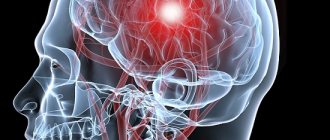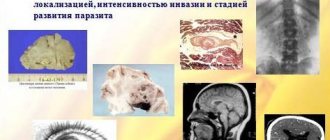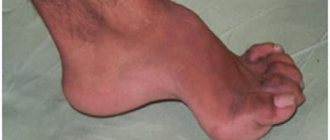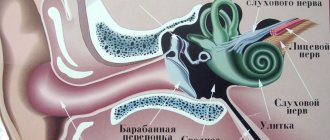Stages and symptoms of Alzheimer's disease
The disease has four stages, with each of which cognitive impairment progresses.
The first stage is pre-dementia
Symptoms of Alzheimer's disease at an early stage are often confused with general manifestations of old age or dyscirculatory encephalopathy.
Most often noted:
- memory disorders;
- difficulties in learning new information;
- difficulty trying to concentrate on something;
- loss of ability to analyze events and abstract thinking;
- apathy, indifference to what is happening;
- loss of interest in communicating with other people.
In everyday life, the not entirely correct term “senile insanity” may be used, the manifestations of which may actually be associated with senile dementia of the Alzheimer’s type.
Stage two – early dementia
Symptoms of the disease begin to appear more clearly, and at this stage the diagnosis is most often confirmed.
Signs:
- aphasia (speech disorders): the patient loses fluency of speech, literacy of statements (the pronunciation of nouns is impaired), finds it difficult to express his thoughts both orally and in writing, forgets the meanings of words or confuses them, vocabulary becomes poor;
- apraxia (motor disorders): the patient finds it difficult to perform simple, habitual movements, has difficulty walking, may shuffle his legs;
- Implicit (unconscious) memory disorder: the patient may forget how to use everyday objects, such as a ballpoint pen, spoon or fork;
- episodic memory disorder: inability or difficulty to remember certain facts from your life;
- Semantic memory disorder: inability to remember the meaning of some words, loss of awareness of generally known facts;
- Clumsiness: Due to problems with fine motor skills and coordination of movements, the patient appears awkward when performing everyday tasks (changing clothes, eating).
Despite the development of dementia, the patient can still adequately communicate with other people, using simple terms and simple phrases. Able to perform simple and familiar actions without assistance.
Stage three – moderate dementia
Due to progressive problems with cognitive functions, the patient's condition worsens, and the signs of the disease become more pronounced.
At this stage the following symptoms appear:
- progressive aphasia: a person forgets words and speaks out of place;
- long-term memory impairment; the patient ceases to recognize close relatives;
- wandering: the patient often cannot remember the way home;
- loss of reading and writing skills;
- severe incoordination of movements, as a result of which the patient finds it difficult to perform everyday household activities; falls and breaks limbs, this can quickly leave him bedridden;
- aggressiveness and irritability; a person may interfere with his care and not accept help; exacerbation often occurs in the evening;
- urinary incontinence.
At this stage, it is advisable to place the patient in a hospital or hire staff for home care.
Severe dementia
At this stage of Alzheimer's disease, the patient is no longer able to perform any meaningful actions without outside help.
At the last stage the patient:
- hardly moves, and later stops leaving the bed altogether;
- cannot eat independently;
- loses a lot of weight;
- loses speech abilities - speech is reduced to fragments of phrases or individual words;
- can be aggressive, but more often he exhibits apathy and indifference.
Death
At the stage of severe dementia, the patient dies. The help of a psychologist will help you accept the loss of a loved one and alleviate suffering. Alzheimer's disease is usually not the direct cause of death. Cognitive impairment and loss of regulation of basic body functions lead to the occurrence of concomitant diseases (bedsores, trophic ulcers, pneumonia) and the development of complications.
Due to the lack of adequate contact with the patient, care and treatment are difficult, and ultimately one of these factors leads to death.
Who's at risk
The exact causes of the disease have not yet been studied. But there are several categories of people who may be at risk. These include people:
- Over 50 years old.
- Obese people.
- Having a history of a hereditary factor.
- Suffering from hypertension or diabetes.
- Having head injuries.
- Leading a sedentary lifestyle.
- Prone to depression.
- With diseases of the cardiovascular system.
- With a low level of education. This is a remarkable fact. It has been noticed that an educated person has a better trained brain and better neural connections, which significantly reduces the risk of developing dementia.
To protect yourself from developing symptoms of Alzheimer's disease, prevention will be important, especially for people at risk.
Diagnosis of Alzheimer's disease
The diagnosis is made based on the patient's complaints, his medical history and his family's observations.
Basic diagnostic methods:
- conversation with a psychiatrist;
- psychological tests;
- memory testing;
- testing of intellectual functions;
- MRI (magnetic resonance imaging);
- CT (computed tomography);
- EEG (electroencephalogram);
- determination of a fragment of amyloid protein (alpha-beta-42) and tau protein in the cerebrospinal fluid.
The main task of specialists will be to exclude alternative diagnoses that have similar symptoms.
The signal for making a diagnosis will be:
- violations of various types of memory according to test results;
- dementia (dementia) according to test results;
- results of medical imaging methods (MRI, CT);
- an increase in the content of tau protein in the cerebrospinal fluid and a decrease in amyloid protein - this sign has important diagnostic value even at the stage of pre-dementia manifestations.
Folk remedies
Folk remedies can enhance the effect of medications. Their main effect will be to improve nutrition and blood circulation in the brain.
Prevention of Alzheimer's disease with folk remedies includes the use of herbs such as:
- Eleutherococcus.
- Chicory.
- Motherwort.
- Echinacea.
- Sagebrush.
- Ginseng.
- St. John's wort.
You can consume herbal infusions in the form of teas, infusions and other remedies. But before starting therapy, you should consult your doctor.
Treatment
There is currently no information about effective treatments for Alzheimer's disease. Therapy is aimed at reducing the activity of degenerative biochemical processes in the brain and improving the patient’s quality of life.
There is information that in 2021, Israeli scientists created a drug that cures Alzheimer's disease in laboratory mice. There are no data on successful treatment in humans yet.
Medicines
There are no drugs that can reverse or at least slow down the progression of the disease.
Drugs called cholinesterase inhibitors are prescribed:
- donepezil;
- rivastigmine;
- galantamine.
These drugs cause side effects: nausea, vomiting, loss of appetite, weight loss, muscle spasms.
To reduce the activity of glutamate, which damages neurons, Memantine is prescribed.
Aggressive patients are prescribed antipsychotics (Sonapax, Phenibut). Hallucinations and delusions are neutralized with haloperidol. They relieve psychosis, but suppress the cognitive functions of the body, which leads to the rapid development of the disease and therefore precludes their daily use.
Doctor's advice
The disease begins as discirculatory encephalopathy, but is characterized by a rapid increase in symptoms of cognitive dysfunction - the patient loses the ability not only to think and reason, but also loses self-care skills. There are no specific tests to identify the disease. They are carried out to exclude other causes - brain cancer, epilepsy, post-stroke changes. Diagnosis is made based on clinical manifestations compared with neurological and psychiatric tests.
Victoria Druzhikina Neurologist, Therapist
Long-term use of psychotropic drugs leads to increased mortality in patients.
Phytotherapy
Herbal preparations also help mitigate the course of the disease. In particular, some medicinal herbs and preparations based on them improve memory, increase concentration, and stimulate intellectual functions. Among them are “Ginkgo Biloba”, “Memoplant”, “Huperzin”, “Vinibis”, “Abixa” and others.
Pay attention to herbal preparations that improve the general condition of a patient suffering from dementia:
- "Elastinol" (to strengthen blood vessels);
- “Coenzyme Q10” (for energy production in body cells);
- tincture of arnica and leuzea (to increase immunity).
Make sure that the patient receives enough vitamin E - it triggers regenerative processes in cells.
Herbal decoctions that can be given to the patient:
- hawthorn;
- elecampane;
- sagebrush;
- dandelion;
- St. John's wort;
- echinacea;
- mint.
Elecampane, wormwood, dandelion, St. John's wort have choleretic, astringent effects - they are contraindicated for gallstones, acute cholecystitis, constipation; hawthorn contains potassium - contraindicated if the pulse is less than 60 beats/min.
Prevention
Prevention of Alzheimer's disease will be aimed at eliminating precipitating factors and mental development over many years. One of the key points will be memory training and a certain diet.
Prevention of Alzheimer's disease in middle age can be achieved by proper nutrition, which includes the following components:
- Omega-3. They participate in the restoration of hematopoietic processes and slow down the destruction of intelligence. Also have a beneficial effect on memory.
- Antioxidants found in corn, spinach, curcumin and other foods.
- To prevent Alzheimer's disease, amino acids found in fresh vegetables and fruits, dairy products and herbs have a beneficial effect. Restore brain function and have a beneficial effect on the condition of nerve cells.
- Products that normalize intestinal function are also very important.
- Dietary drinking habits play an important role in the prevention of Alzheimer's disease in old age. If there are no contraindications, green tea should be included in your diet.
- It is recommended to take vitamin complexes as prescribed by a doctor.
When preventing Alzheimer's disease, the following foods should be avoided:
- Sugar.
- Flour products.
- Spicy, fatty, smoked foods.
Features of care and relief of the patient's condition
Patients with Alzheimer's disease, especially those in the advanced stages of dementia, are difficult to care for. Often they already find themselves bedridden, contact with them is broken (it is impossible to find out how they are feeling, whether something hurts, whether they want to eat, etc.).
It makes sense to call a neurologist at home and raise the question of hospitalization if:
- he refuses to eat for a long time and is rapidly losing weight;
- refuses medications, does not accept care and assistance;
- shows aggression.
At the same time, patients at the initial and moderate stages of the disease will be better off at home. They may be afraid of a change of situation and make attempts to escape from medical institutions, but at home they will feel good with their circle of loved ones.
Many noted that caring for a patient takes up most of the day. If family members do not have time, a caregiver should be hired.
Here are some tips to help a loved one with Alzheimer's disease:
- Prepare him his favorite dishes. Let the food be tasty, healthy and varied.
- Do not discuss his condition in front of a patient - this will offend him and hurt his self-esteem.
- Do not shout or offend - it is not the person who is to blame, but the disease.
- Joke with the patient (about anything except his condition and illness), cheer him up, tell stories and news.
- Provide the patient with interesting activities, preferably those that are familiar to him.
- Do not change the arrangement of furniture and objects in his room.
- Ensure safety: hide knives, scissors, knitting needles and other sharp and cutting objects.
- Keep an eye on the patient, do not leave him alone.
Medicine is moving forward every day - perhaps in the coming years a drug will appear that will help, if not cure, but at least stop the development of this increasingly widespread disease.
If necessary, you can see a neurologist, a psychiatrist, or find a good psychiatric clinic.
To learn how to prevent the development of Alzheimer's disease, watch the video:
This article has been verified by a current qualified physician, Victoria Druzhikina, and can be considered a reliable source of information for site users.
Bibliography
1. https://ncpz.ru/siteconst/userfiles/frdcl.pdf
Rate how useful this article was
5 3 people voted, average rating 5
Did you like the article? Save it to your wall so you don’t lose it!
General description of the disease
Alzheimer's disease is a neurodegenerative disease that can develop asymptomatically for many years. It has been observed that women are more susceptible to Alzheimer's disease than men. The patient's character begins to change, intelligence decreases, and memory loss occurs. Many attribute this to the aging process. Despite the fact that there is still no cure for this disease, modern medicine has treatment methods that can reduce the symptoms of the pathological condition and increase the patient’s life expectancy.










